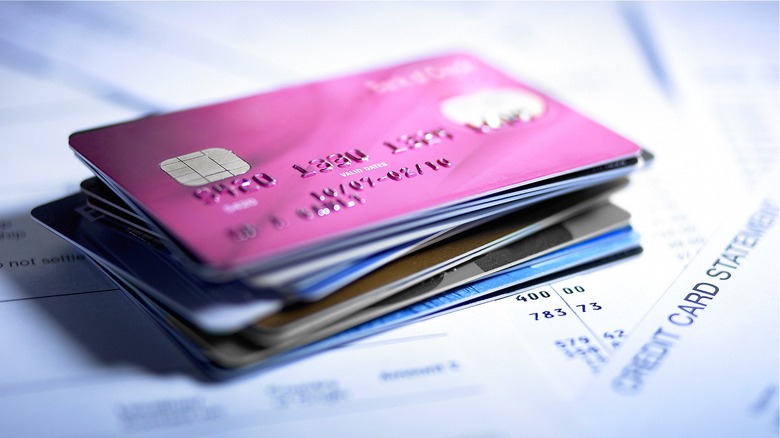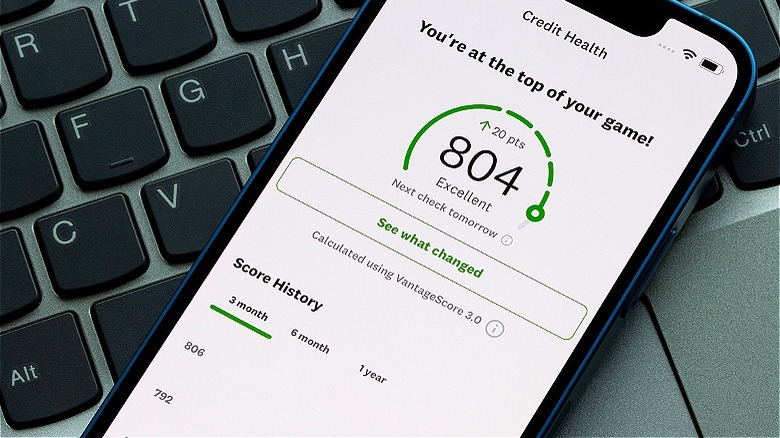How Too Many Credit Card Applications In A Short Span Affects Your Credit Score
Whether you're planning ahead for big purchases, or are looking to take advantage of cash back or other rewards perks, you might find yourself shopping for a new credit card. While there can be a lot to consider when it comes to choosing a new credit card (like APR, credit limits, perks, etc.), there can be even more to know about the credit card application process. From how long it takes to get approved for a credit card to what your chances of getting approved for certain card types might be, the process can feel overwhelming. Perhaps one of the most important things to keep in mind about the credit card application process, though, is how your applications can impact your credit score.
Generally speaking, a credit card application involves a hard credit check. These hard inquiries not only show up on your credit report but can (and do) negatively drop your credit score. This means that applying to several credit cards all at once or in a short period of time can not only damage your credit score but also make you look suspicious to credit lenders who will, in turn, be less likely to want to issue you new lines of credit. Taking advantage of preapproval offers (which are generally soft credit checks that can give you a better idea of your approval odds), as well as making sure your existing credit score fits the recommended levels for your selected credit card, can be extremely important before formally applying for a new card.
Understanding your credit
Numerous categories go into calculating credit scores. What's more, depending on the exact credit reporting company you use, your credit score could be different across different services (remember to check your credit score often). In addition to hard inquiries, rapidly applying to multiple credit cards can also affect both the length of your credit history and the new-credit categories that make up your credit score. According to FICO, the age of your credit accounts for 15% of your score. Since the age of your credit is the average of your various (revolving and installment) accounts, opening new accounts lowers the overall average age of your credit history. New credit, worth 10% of your credit score, allows lenders to see how many new lines of credit you've opened more recently. This category can help lenders determine if you're a higher risk, which can impact their willingness to approve new or extended lines of credit.
It's also important to remember that the biggest factor in your FICO score is your payment history. Ensuring you can pay off at least your minimum balance every month keeps your account, and your overall credit score, in good standing. This is another reason why signing up for multiple credit cards at the same time can prove dangerous. Overspending can leave you with late fees, excessively high interest rates, and even prolonged credit card debt. Making sure to only have as much available credit as you need, without the temptation to have and spend more, can be key in maintaining your credit score.
Things to keep in mind about credit cards
For starters, one of the best ways to ensure the health of your credit is not to apply to more than one credit card in a six-month period. This is not only to help your credit score but also to make sure you avoid potential issuer restrictions. Many bank and credit card companies have application restrictions that could ensure you get denied for a new card. Many have limitations on not just how often you can apply for a card (see Chase's 5/24 rule), but also how many credit cards you can even hold from their individual institution. For instance, Capital One limits cardholders to one new credit card every six months, but also only allows cardholders to have two Capital One credit cards open at any given time.
Keep in mind that just because you should wait between applying for a new credit card doesn't mean you can't still pursue multiple credit cards to best fit your needs. As your spending habits evolve, it can be crucial to apply for or change your credit card type. The key is to take on these cards in a slow and well-thought-out way, to best help not just your credit score but also your personal finances. With U.S. credit card debt at $1.12 trillion (and 9% of balances entering delinquency in the first quarter of 2024), it's more important than ever to be deliberate with your credit card decisions. Plus, remember that there are many things you should avoid paying for with a credit card.


